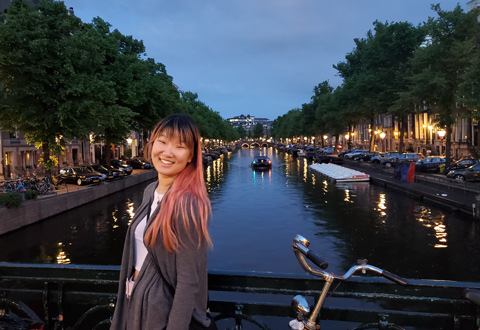ARUSH LAL
By: KELLEY FREUND | Categories: Alumni Achievements

BA 17, PAHO/World Health Organization
What research is happening in your field that will change the world?
From a young age, Arush Lal learned a tough lesson: Illness is universal, but healthcare resources and support are not. During a trip to India when he was 12, he saw a poor man pulling himself along on a makeshift wheelchair. At 18, when he was working at a Dominican hospital, he saw a man die because of an ineffective response. And while setting up mobile clinics in Panama, he met a boy who had walked for miles to find diabetes medication for his grandmother.
It was this group of people that inspired Lal to enter the global health field. Today, he works with the World Health Organization’s Americas Office, where he helps member states purchase essential supplies, such as HIV and cancer medications. And while he has helped procure 15 million Covid-19 test kits, Lal knew from his professional experiences during Ebola and Zika outbreaks the importance of ensuring access to those other medications and supplies.
"I knew that this pandemic could make policymakers prioritize Covid-19 response over routine health service," he says. “During the Ebola outbreak, more women died from a reduction in services for maternal health and more children died from a reduction in measles vaccinations than died from Ebola. Our team has to be proactive, or we will run into the same issue of people dying from preventable diseases.
It’s this intersection of policy, universal health coverage, and pandemic preparedness that really interests Lal, and he is currently completing a PhD program in the London School of Economics on the topic.
“There are so many drivers of health: your economic status, your ZIP code, race,” Lal says. “For too long, we’ve been addressing the symptoms of health rather than the roots of it. What if people had access to health facilities where they live, instead of having to drive 60 miles to the nearest one? Or what if healthcare wasn’t tied to a job, so that if the world is facing a pandemic and you lose your job, you won’t lose your insurance?”
Lal says those in the field are thinking more critically about this than ever before, and more and more people are now understanding that universal health coverage can be a foundation in building strong health security systems.
Lal believes STEM schools can also be key players in building strong systems by offering more health programs that train students in the interdisciplinary aspects of global health and innovation. Lal, who has been pushing for Tech to start a global health systems and technology (GHST) major ever since he was a student, says most health programs at STEM schools do not provide a platform to learn about public policy, international affairs, healthcare, cultural and behavioral training, or many of the other hats that public health professionals wear in a single day.
“Virtually no program worldwide provides this holistic foundation for global health students to meet today’s healthcare challenges,” he says. “But that can change. By offering a degree at the bachelor’s level in GHST, STEM schools can create a paradigm shift and truly make an impact by addressing key gaps.”


